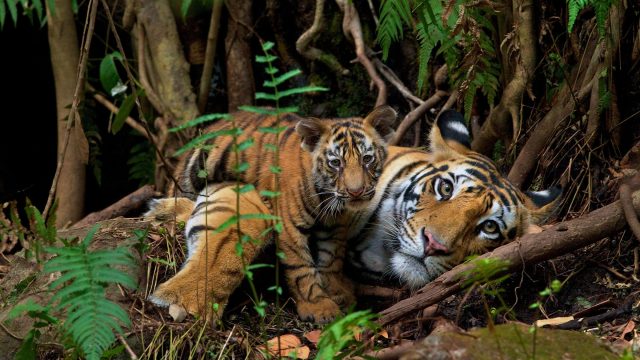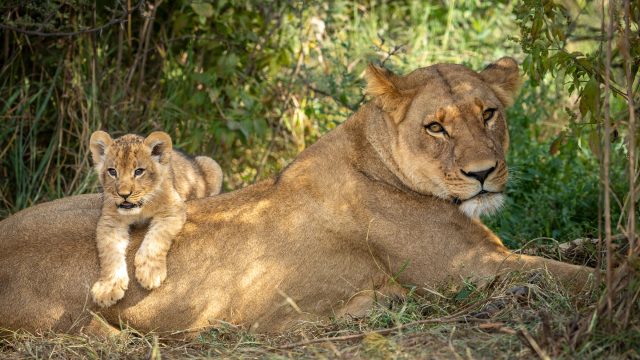Live Animal Mascots: A Tradition of Exploitation, Not Conservation
Since 1936, Louisiana State University has kept a series of live tigers as mascots, all named Mike. The most recent tiger, Mike VI, was euthanized in October after a four-month battle with cancer. LSU also promotes Mike as a tourist attraction, and has already begun searching for Mike VII.
All tigers are classified as endangered species. They need meaningful conservation, not exploitation for entertainment. LSU’s archaic tradition should be laid to rest, rather than perpetuating America’s tiger surplus by helping a commercial breeder stay in business just for the sake of obtaining a live mascot for use as an entertainment prop.
In 2007, LSU acquired Mike VI from an Indiana breeder-dealer whose federal license to exhibit and deal animals was permanently revoked in 2010 when federal officials found dozens of serious violations of the minimum standards of care prescribed by the federal Animal Welfare Act. Mike VI, like most tigers in America, was a “generic tiger,” meaning he was intentionally cross-bred—a practice embraced by many unscrupulous exhibitors around the country that took advantage of a since-closed legal loophole to skirt U.S. Fish & Wildlife Service protection and regulation.
The university’s athletics website proudly describes what a typical Saturday afternoon for the LSU mascot has been like:
Mike’s ride through Tiger Stadium before home games in a travel trailer topped by the LSU cheerleaders is a school tradition. Before entering the stadium, his cage on wheels is parked next to the opponent’s locker room … Opposing players must make their way past Mike’s cage to reach their locker room.
These tigers have spent their lives in captivity just to be an accessory to the sports season.
LSU’s site also recalls a day from the life of Mike IV:
Pranksters cut the locks on Mike IV’s cage and freed him in the early-morning hours. Mike roamed free…before being trapped in the Bernie Moore Track Stadium where veterinarian Dr. Sheldon Bivin used tranquilizer guns to capture and return the Bengal Tiger to his home.
These are the stories about Mike’s captivity that the university is eager to advertise.
Studies show that people who see exotic animals forced to live in artificial settings not only learn nothing at all about the species, but also walk away with reduced interest in legitimate conservation efforts.
We strongly encourage LSU, and every university with a live animal mascot, to only utilize costumed human mascots—who are more entertaining, less likely to pose a threat, and do not require subjecting apex predators to lives of deprivation of their complex needs. Southern University in Baton Rouge has elected to use only human mascots since its last live mascot, a jaguar named Lacumba, was found dead in the cage in which she was confined in 2004.
Keeping a live animal mascot—especially an endangered species—has everything to do with catering to the whims of fans and boosters, and nothing to do with legitimate conservation. Any 21st-century institution of higher learning should know better than to condone and actively participate in the commercial trade and exploitation of exotic animals. We’ve learned from history time and again that “tradition” is not a sufficient reason to continue exploitative practices. The time has come for LSU to turn away from a tradition of exploitation, and to contribute to legitimate tiger conservation.
Focus Area
Issues
Related
-
Tentative Settlement Reached in Texas Endangered Species Act Lawsuit
The Animal Legal Defense Fund and National Foundation for Rescued Animals, an animal exhibitor doing business as Tiger Creek Animal Sanctuary, have tentatively reached a settlement, pending the dismissal of the Endangered Species Act lawsuit filed in March 2022.February 28, 2024 Press Release -
Animal Legal Defense Fund Urges USDA to Revoke AWA License from Convicted Wildlife Trafficker
The Animal Legal Defense Fund submitted a complaint urging the USDA APHIS to investigate and revoke the AWA exhibitor license for Jason Clay.February 27, 2024 Press Release -
Animal Legal Defense Fund Urges USDA to Strengthen Regulations for Handling and Exhibiting Wild and Exotic Animals
Recommendations aim to decrease risk of zoonotic disease spread, animal escapes and attacks, and psychological and physical harm to the animalsApril 11, 2023 Press Release



